

iKnow Community: The innovation, Foresight & Horizon scanning community. MyForesight - National Foresight Institute. Foresight Africa: Top Priorities for the Continent in 2013. Africa starts 2013 with hope and optimism.
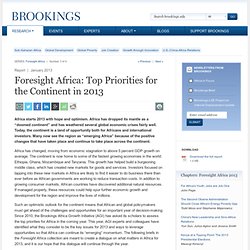
Africa has dropped its mantle as a “doomed continent” and has weathered several global economic crises fairly well. Today, the continent is a land of opportunity both for Africans and international investors. Many now see the region as “emerging Africa” because of the positive changes that have taken place and continue to take place across the continent. Africa has changed, moving from economic stagnation to above 5 percent GDP growth on average.
The continent is now home to some of the fastest growing economies in the world: Ethiopia, Ghana, Mozambique and Tanzania. Programming the post-human: Computer science redefines “life”—By Ellen Ullman. Thoughts on the Future of Content - Gautam John's Blog. UPDATE February 2012 — The Food Crises: Predictive validation of a quantitative model of food prices including speculators and ethanol conversion. Www.necsi.edu New England Complex Systems Institute 238 Main Street Suite 319, Cambridge, MA 02142 Phone: 617-547-4100 Fax: 617-661-7711 Cite as: M.
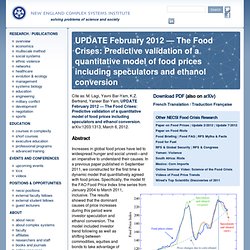
Lagi, Yavni Bar-Yam, K.Z. Bertrand, Yaneer Bar-Yam, UPDATE February 2012 — The Food Crises: Predictive validation of a quantitative model of food prices including speculators and ethanol conversion.arXiv:1203.1313, March 6, 2012. Abstract Increases in global food prices have led to widespread hunger and social unrest—and an imperative to understand their causes. NECSI Food Price Update Warns of Crisis by 2013 CAMBRIDGE (March 6)--According to a new study from the New England Complex Systems Institute the next food price bubble will occur by 2013. 10 Things You Should Know About Hitler: Predictions From 1932 - Brian Resnick - International. Based on a reading of Mein Kampf, an Atlantic author imagines what Germany might become should the aspiring dictator "succeed in gaining control of the German government.

" In 1932, Hitler had not yet taken power in Germany. But he was close. What would happen to Germany if the Nazis were to rule? That was a question that had a surprisingly easy answer. Using Pattern Analysis and Systematic Randomness to Allocate U.S. Border Security Resources. The U.S.
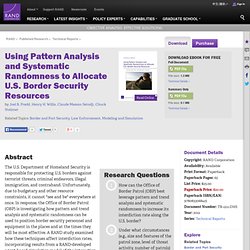
Department of Homeland Security is responsible for protecting U.S. borders against terrorist threats, criminal endeavors, illegal immigration, and contraband. Unfortunately, due to budgetary and other resource constraints, it cannot "see and be" everywhere at once. In response, the Office of Border Patrol (OBP) is investigating how pattern and trend analysis and systematic randomness can be used to position border security personnel and equipment in the places and at the times they will be most effective. A RAND study examined how these techniques affect interdiction rates, incorporating results from a RAND-developed agent-based simulation model of the interaction of border patrol agents and illegal smugglers. What’s the Potential for Conflict with China, and How Can It Be Avoided?
Presents scenarios to illustrate possible sources of military conflict with China over the next thirty years.

This report is part of the RAND Corporation research brief series. RAND research briefs present policy-oriented summaries of individual published, peer-reviewed documents or of a body of published work. Permission is given to duplicate this electronic document for personal use only, as long as it is unaltered and complete. Copies may not be duplicated for commercial purposes. Oxford Institute for Ethics, Law and Armed Conflict. The idea of a ‘responsibility to protect’ (R2P or RtoP) has been the international community’s primary response to the problem of humanitarian intervention to prevent gross violations of human rights.
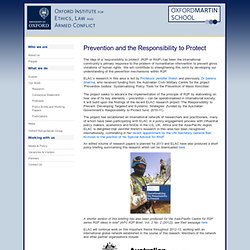
We will contribute to strengthening this norm by developing our understanding of the prevention mechanisms within R2P. ELAC's research in this area is led by Professor Jennifer Welsh and previously Dr Serena Sharma, who received funding from the Australian Civil- Military Centre for the project ‘Prevention toolbox: Systematising Policy Tools for the Prevention of Mass Atrocities’ The project seeks to advance the implementation of the principle of R2P by elaborating on how one of its key elements – prevention – can be operationalised in international society. It will build upon the findings of the recent ELAC research project ‘The Responsibility to Prevent: Developing Targeted and Systemic Strategies’ (funded by the Australian Government’s Responsibility to Protect fund, 2010-11).
Political Instability Task Force: Main Page. Responsibility To Protect Index. Uncertain World: Sovereignty as the Foundation of BRICS Unity. Each BRICS summit sets off a new round of debates on the essence and the future of this unusual international format.
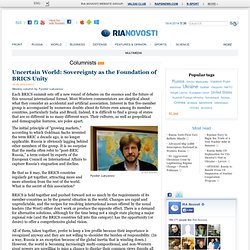
Most Western commentators are skeptical about what they consider an accidental and artificial association. Interest in this five-member group is accompanied by numerous doubts about its future even among its member-countries, particularly India and Brazil. Indeed, it is difficult to find a group of states that are so different in so many different ways. Their cultures, as well as geopolitical and demographic features, are poles apart. © RIA Novosti. Fyodor Lukyanov The initial principle of “growing markets,” according to which Goldman Sachs invented the term BRIC a decade ago, is no longer applicable.